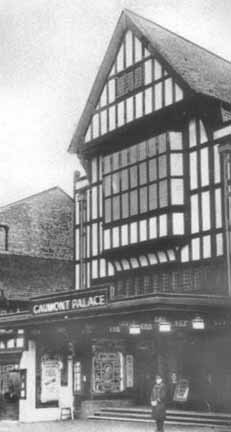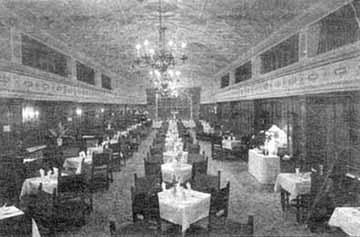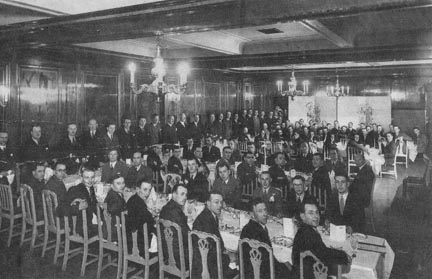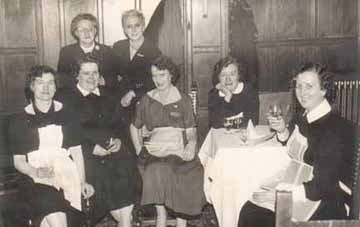The
Black
&
White
Picture
Place
A Brief History of Cinema in Chester
by David A. Ellis and Steve Howe
Introduction | Music Hall | Tatler/Classic | ABC Regal | Odeon | Park, Saltney | Majestic | Others | Advertisments
The Gaumont Palace
 Chester’s first ‘super cinema’, the Gaumont Palace, Brook Street opened on 2nd March 1931. Chester’s first ‘super cinema’, the Gaumont Palace, Brook Street opened on 2nd March 1931.The hall, designed by William T. Benslyn and run by Provincial Cinematograph Theatres, a part of Gaumont British (which later merged with Rank), housed 1,997 seats- but rounded up to 2,000 in their advertising. The Mayor, John Morris performed the opening ceremony. Among the many in attendance were the architect and the Sheriff of Chester, Robert Matthewson. He would later open Chester's last super cinema, the ABC Regal. The opening attraction was On Approval, a comedy by Frederick Lonsdale.  A grand Compton organ was installed that used to rise up from the stage to provide music during the interval. It was played in the opening week by Leslie James. He was famous, having made many broadcasts and recordings. Rowland H. Cutler became the full time organist. Later Sydney Gustard played and made broadcasts from the cinema. The first manager was Mr F D. Rowley; he had been transferred from the Glynn in Foregate Street. A grand Compton organ was installed that used to rise up from the stage to provide music during the interval. It was played in the opening week by Leslie James. He was famous, having made many broadcasts and recordings. Rowland H. Cutler became the full time organist. Later Sydney Gustard played and made broadcasts from the cinema. The first manager was Mr F D. Rowley; he had been transferred from the Glynn in Foregate Street.The frontage of the building was 'Mock Tudor', in keeping with the character of the city. Our photograph (right) shows how it looked in 1937. The entrance hall was likened to an Italian Palace- the ceiling coloured blue and gold, relieved in red. The fan-shaped auditorium's ceiling was coloured orange, relieved by green, mauve and red. Illumination was by a double tier lighting feature. The upper line of light was circular and the lower hexagonal. In the centre was a diamond shaped decorative grille pierced for air extraction. Coves housed most of the auditorium lighting. It was stated at the time of opening that the balcony- seating 800- was probably the largest in Northern England. The Gaumont was the the only Chester cinema to house a restaurant- and a grand one at that- the sumptuous Tudor-style Oak Restaurant which remained open all day for patrons and non-patrons to dine. The staff (illustrated bottom of page) was lined up each day for inspection. The projection room was equipped with three projectors, manned by a team of seven projectionists. There was also a slide projector and a spotlight. At the side of the stage, a bank of switches controlled lighting. The stage itself was 30ft deep. At the back there were nine dressing rooms.  Occasionally live shows were presented. The screen was flown for this purpose. I remember (David Ellis writes) my wife Joan and I going to see Cliff Richard there with our friends Jim and Alice Stanley. We had to come out at the interval as we couldn't hear Cliff for the loud screaming of the girls. I suppose most of them are grandmothers by now... Occasionally live shows were presented. The screen was flown for this purpose. I remember (David Ellis writes) my wife Joan and I going to see Cliff Richard there with our friends Jim and Alice Stanley. We had to come out at the interval as we couldn't hear Cliff for the loud screaming of the girls. I suppose most of them are grandmothers by now...
The cinema finally closed on 9th December 1961 with the film The Marriage Go Round. It is alleged that Rank had actually intended to close the Odeon, not the Gaumont. The builders had moved in, destroying ornate plasterwork. It is said that Rank realised their mistake and ordered the builders to stop- but it was too late, extensive damage had already been done... "I think my favourite was the Gaumont Cinema which stood in Brook Street and is now a bingo hall. It housed a wonderful Wurlitzer Organ and had silk drapes across the screen. We were entertained during the interval with the organ. The lights were dazzling rainbow colours. Go on to learn a little of a cinema that once stood in Foregate Street, the Tatler- later known as the Classic... |
Top
of Page
| Chester's Cinemas I | II | IV | V | VI | VII | VIII | IX | X | The Royalty Theatre |
Chester
Gallery
Introduction
Old
Pics
of
Liverpool
&
Chester
| B&W
Picture
Place
|
Site
Front
Door
|
Site
Index
|
Contact us
